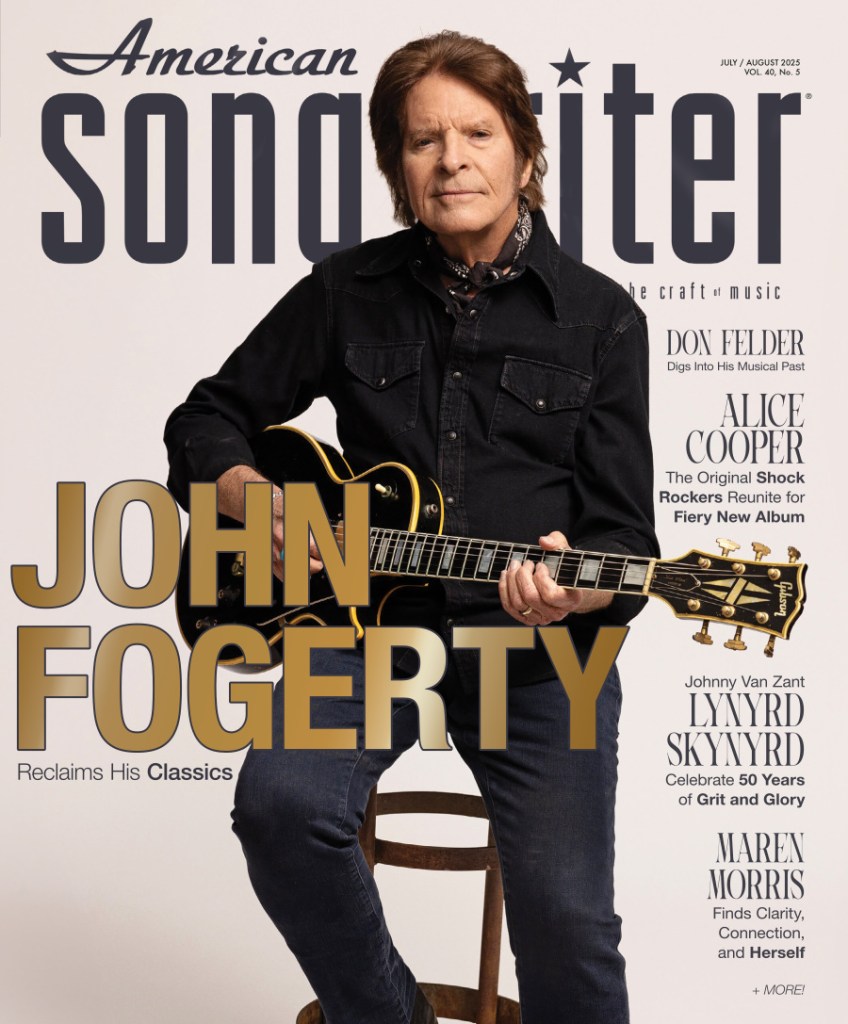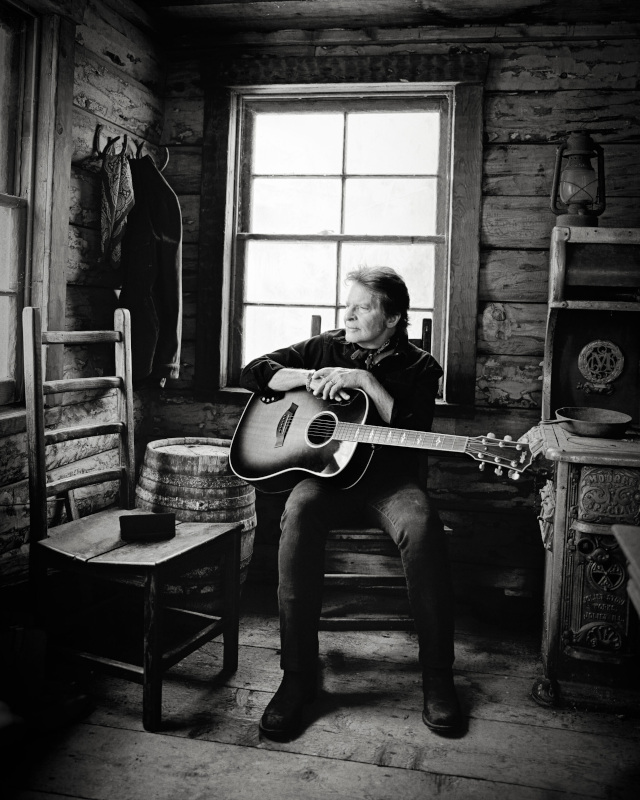As the primary songwriter, lead vocalist, and lead guitarist for Creedence Clearwater Revival (CCR), John Fogerty was the driving force behind the band’s biggest hits. From the late 1960s through the early 1970s, CCR had 14 consecutive singles reach the Top 10 on the U.S. charts, including “Proud Mary,” “Born on the Bayou,” “Bad Moon Rising,” “Lodi,” “Down on the Corner,” “Fortunate Son,” “Who’ll Stop the Rain,” “Up Around the Bend,” “Run Through the Jungle,” and “Have You Ever Seen the Rain.”
Videos by American Songwriter
But for five decades, Fogerty was locked in numerous legal battles with his former record company, which owned the rights to his songs. This meant that he spent years watching his work being used in numerous commercials and movies without his permission. Finally, in January 2023, he announced that he had gained controlling interest in the worldwide publishing rights to his work.
Now, he says he’s “back to this place where the music is very joyful again, and my relationship with these songs is now, again, very happy, very innocent and sublime. It’s amazing. I mean, when you don’t have something that probably should be yours, there’s all kinds of emotions involved in that. And then, finally getting everything to be OK, I think it’s just a sense of equilibrium. It’s a quiet assuredness that I’m the one who gets to decide the destiny of these songs, which is really nice.”

To celebrate, Fogerty set about rerecording 20 of his most beloved songs from his CCR years. The resulting album, Legacy: The Creedence Clearwater Revival Years (John’s Version), is set for release on August 22 via Concord Records.
In a way, this has been in the works for a long time. “Years ago, my wife, Julie, had some sort of a vision that was very joyful to her, and she suggested to me then about rerecording [my songs],” Fogerty says, but “it was not something I was chomping at the bit to do. I had a very complicated relationship with my own songs because of all the business and the politics of it, and even the finances of it—all that. It wasn’t necessarily a blissful state of mind.
“And then, she managed to get my publishing back, making something come to be that everyone said would never happen, including myself. And then she kind of started making those noises again: ‘Well, maybe you should think about rerecording now.’ Slowly, I came around, and I found myself fully engaged trying to make this record the best doggone record I could make in my whole life.”
Legacy was truly a family affair: besides Fogerty’s wife inspiring him to undertake this project in the first place, his sons, Shane and Tyler, also played on the album. “As a dad, I’m so delighted that we did this all together, and it was very important and helpful that they were there with me.” For instance, he says there were times when Shane would show him the correct way a riff should be played, because he was actually more familiar with it since Fogerty himself hadn’t listened to some of his own original recordings in up to 40 years.
Fogerty knows expectations are high for this album, and he promises he has stepped up accordingly. “Something like this that involves the songs that I wrote, the performances of myself and my bandmates from those days, the way people revere these songs over many, many years—you can’t approach it casually,” he says. “There’s a lot of different perspectives demanding that you do a good job, especially if you’re the guy in the center that all of this revolves around. It would have been a horrible mistake to think that I could just go in and kind of waltz my way through.”
It would’ve been surprising if Fogerty had taken the easy route with Legacy, because he’s long been known for his meticulous approach to his craft, especially his songwriting. Taking several months to piece together a song is, he says, “the absolute way I think that you need to do this.” He points to the track “Proud Mary,” which was a No. 2 hit for CCR in 1969 (and also a Top 10 single for Ike & Tina Turner when they released a cover of it in 1971) as a prime example of this method.
“I knew it was a really, really good song—it was far above anything I had ever done,” Fogerty says about the moment he finished writing “Proud Mary.” “I was sitting there with an unrecorded, unperformed song in my hands and telling myself, ‘My God, this is a classic.’ And I was trembling with excitement. [It was] almost like turning lead into gold, or some weird discovery of the universe—and then realizing I was the only one that knew that I had done this.”
That song would prove to be the catalyst for the way Fogerty has written his songs ever since. It can be traced back to 1967, when he was in the army reserves, worrying about getting called back to active military duty (especially because the Vietnam War was still raging) while also trying to figure out how to keep his music career going.
“And I tell myself, ‘You’ve got to get more organized with your music. The first thing you’ve got to do is get your songwriting more in shape, and that means being more diligent about it.’ Because whenever I had an inspiration, I’d run around the house looking for a crayon and a piece of paper. And I decided, ‘You’ve got to get to where you’re getting ahead of it.’”
Even though he had almost no money to spare, he went to the drugstore and bought himself a small notebook, determined to write his songs in it. “A few days later, the phrase ‘proud Mary’ came to me. I didn’t know at all what that meant. So I wrote that on the very first line of this book, and proceeded over the next days and weeks and months to write things on the rest of the pages.” (On that same first page, he would also jot the line ‘bad moon rising,’ which would become the title of another major hit for Creedence Clearwater Revival in 1969.)
About nine months later, Fogerty received an envelope that contained a notice of his honorable discharge from the Army. “I am, of course, overjoyed about this turn of events, because I’m free,” he says. “I literally turn a cartwheel on the little patch of lawn in front of the apartment, run inside, pick up my Rickenbacker guitar, and start strumming some chords. And the first thing that came out of my mouth is, Left a good job in the city / workin’ for the man every night and day. And so I write that down.

“Finally, I come up with the phrase, rollin’, rollin’ on the river. I go, ‘That’s starting to sound like something. What is this? Maybe I should look in my book,’ which now has many pages with stuff on them. And I opened the book, and right there on the first page, it says, ‘Proud Mary.’ And the bottom line says ‘riverboat.’ I go, ‘Oh, ‘Proud Mary’ is the name of a boat! This is a song about a riverboat!’” That was the process, and it took months to unfold. I got the ground ready for it before the inspiration.”
His military experience inspired another (more unorthodox) songwriting technique that he has favored ever since. He remembers “hallucinating out in the very hot sun, marching around with a whole company of other guys. They’ve got to keep you busy, so for about three hours a day, they would just march you around ’til you were exhausted. I think I was meditating.” This is when he came up with the elements that would eventually coalesce into the song “Porterville.”
When he was able to go home from the Army Reserve, he continued to employ that same approach. “I was staring at the walls in my apartment late at night, being very quiet, without a guitar in my hand, and imagining a song rather than humming the melody. That was how I wrote ‘Born on the Bayou.’ That was an essence first, and a title, before it was actually a song.”
“Born on the Bayou,” the opening track on Creedence Clearwater Revival’s 1969 album Bayou Country, earned the band gold sales status. It is also a prime example of Fogerty’s habit of incorporating Southern elements into his work, despite the fact that he was born and raised in Northern California. This would become one of the defining traits of his songwriting.
“It just seemed to resonate with me—Southern music just was what I loved,” he says, noting that many of his favorite artists came from the South, such as Elvis Presley, Bo Diddley, Muddy Waters, Howlin’ Wolf, Sam Cooke, Jerry Lee Lewis, and Carl Perkins. “Because it was clearly different than my California culture, it was much more fascinating to me.”
This Southern influence was evident in Creedence Clearwater Revival from the start: the band’s first single, “Suzie Q” (1968), was a cover of a 1957 Dale Hawkins song that Fogerty had loved since he was a kid. “It had that great guitar lick, to me, that’s very Southern,” he says. “It’s just a swampy, soulful thing that the whole song could be built around. I think at that moment of recording ‘Suzie Q,’ I was putting my two feet into that pond, instead of the so-called British Invasion pond that the record company had wanted us to do. ‘Suzie Q’ allowed me to express myself, at least musically.”
It may have seemed like a surprising path for him to take, but it felt authentic to him, and he advises aspiring artists to go with what resonates with them, too, even if it may seem strange at first. “I certainly would counsel anyone that wants to be any kind of writer to go to that place that makes you feel that way,” he says. “It might not be some other guy’s particular thing, but if it’s yours, then that’s where you belong.
“And here’s the other thing: don’t write something, or create something, thinking, ‘That guy over there is really going to think this is cool.’ Because what you’re doing there is, you’re stepping outside of your own thing. I know that whenever I’ve done that, it’s been a complete dud. It’s not fulfilling your own feelings; it’s sort of pretending. And it usually doesn’t work.”
That said, Fogerty admits that even he can’t fully explain how the songwriting craft happens: “There’s a great sense of wonderment, maybe even that it’s magical, about the process. And I’ve been doing it long enough to where I’m kind of a bit scared of it,” he says.
Even though the creative process has always been something of a mystery to him, Fogerty says that he has always known he was destined for a music career, especially the songwriting aspect of it. “I know that you almost have no choice,” he says. “My mom told me that she went to a Beethoven concert when she was pregnant with me, and I started really kicking up a storm. I’m sure I was probably inspired and loved it. When I was very young, I would dance around in my diapers and sing the popular songs of her day.
“When I was three years old, my mom gave me a little yellow record. As far as I know, this thing was my first possession. She played the record. On one side was ‘Oh! Susanna!’ and the other side was ‘Camptown Races.’ And then she explained to me that Stephen Foster was the songwriter of both songs. At this very early age, to explain what a songwriter is, it’s mind-boggling. It opened a couple of doors. All of my life, I’ve certainly taken note of Stephen Foster and that particular type of song. It’s very American, and he speaks about our values.”
As he got a bit older, his mother would take him to folk festivals. “So she exposed me to a lot of music,” he says. “Obviously, she thought that was something that was instructive for me, and something she thought I’d like.”
Fogerty met his future CCR bandmates while in junior high school in El Cerrito, just outside San Francisco, and they formed a cover band together; his older brother, Tom, who sang and played rhythm guitar, completed the lineup. When they later began playing original material, Fogerty was the main songwriter and lead guitarist, and he also took over the lead singing duties from his brother.
After releasing several singles under different band names but not finding much success, in 1968 they officially renamed themselves Creedence Clearwater Revival. That same year, they released their self-titled debut album, which did moderately well. However, when they released Bayou Country the following year, everything changed. Besides “Born on the Bayou,” the album also contained “Proud Mary.”
And the hits kept on coming: by the time CCR disbanded in 1972, they had released seven studio albums, all of which have earned gold or platinum sales status. Their greatest hits collection Chronicle: The 20 Greatest Hits, has spent 14 consecutive years on the Billboard 200 album chart. The band was inducted into the Rock and Roll Hall of Fame in 1993.
Post-CCR, Fogerty launched a solo career. He had massive hits in the mid-1980s with the tracks “The Old Man Down the Road” and “Centerfield.” (And, because “Centerfield” has become a staple at baseball games, Fogerty is also the only musician to ever be inducted into the Baseball Hall of Fame.) His 1997 album, Blue Moon Swamp, won the Grammy Award for Best Rock Album.
Fogerty credits learning to self-edit early on as being a big reason why he seems to have a high percentage of songs that connect with listeners. “Back in those times, I would tell people, ‘Look, for every song you hear from me, I’ve written 10 clinkers,’” he says. “The deal is, I wouldn’t finish the clinkers—at some point, you start to realize, ‘This sucks.’ So, you’re not going to finish that because it’s just not good enough. And finally, when one was good enough, you recognized it and kept going. I think that helps explain that most of the things I considered finishing were probably going to be pretty good songs. I think that I certainly made a mark and wrote a lot of good songs and made good records out of them.”
Now, firmly in possession of his own songs and with Legacy on the way and a happy home life, Fogerty is completely at peace. “I’m having the time of my life,” he says. “By God’s grace, I get to put out this record that I feel really, really great about, because it sounds really good to me, and I get to have my family around me that I feel such love for and with. I want everybody to just know that I’m having a great time.”
Cover photo by David McClister











Leave a Reply
Only members can comment. Become a member. Already a member? Log in.